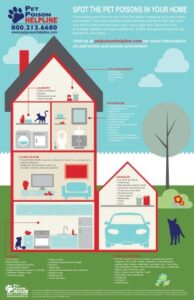By: Lisa Malkin, Director of Hospital Administration for Humane Veterinary Hospitals
In 1961 Congress designated the third week in March as National Poison Week to raise awareness of poisoning risks. But did you know that poisoning prevention is an important issue not just for humans, but for pets as well?
Each year over 100,000 pets are accidentally exposed to toxins, resulting in emergency trips to the Veterinarian or calls to the Pet Poison Control line.
What are the most common poisons or toxins ingested by pets and where are they found? Not surprisingly, the greatest risk to pets are found around the home. Plants, foods, human medicines, cleaning supplies and automotive products are responsible for the vast majority of per poisoning cases reported to veterinarians and poison control centers.
Here are a few of the most common as reported by the Pet Poison Helpline and the ASPCA Poison Control:
- Plants. There are over 1000 common plants that can prove toxic to pets. While not all toxic exposures are life threatening, it is important to take any potentially harmful exposure seriously. Lilies, Azaleas, Aloe Vera, Sago Palm, English Ivy, Philodendron, Hydrangea, Poinsettia, Dieffenbachia, and Oleander are among the leading causes of poisoning among pets and should be avoided.
- Foods. Many common human foods may also present a poisoning risk to pets. Highest on the list are products containing alcohol or caffeine.. Caffeine-containing products such as coffee, coffee beans, and chocolate can result in life threatening conditions, including tremors, arrhythmias, seizures, and death. Other common foods pets should avoid include avocado, citrus fruits, grapes, raisins, coconut, nuts, garlic, onions, yeast dough, and any processed foods containing the sweetener Xylitol. If you believe your pet has ingested any of these substances, contact your vet or local poison control center.
- Household & Automotive Products. Many household and automotive products also pose a poisoning risk to pets. Bleach, ammonia, cleansers, and antifreeze that contains ethylene glycol are highly dangerous to pets and should be stored in sealed containers where pets cannot access them. Many common cosmetic products—such as soap, mouthwash, deodorant, nail polish, polish remover, nail glue, sunscreen, toothpaste, and shampoo—present a poisoning risk to pets and should be stored away from places your dog or cat can reach.
- Human Medications. Many of these drugs are not appropriate for use in animals. Human doses of medications are often too potent to be safely ingested by pets.
In case of a Pet Poisoning Emergency:
If you suspect that your pet has ingested a toxic substance, do not wait for symptoms to appear. Call your Veterinarian, the local Vet Emergency Hospital or the Pet Poison Helpline at (855) 764-7661 or ASPCA Poison Control at (888) 426-4435 immediately.

